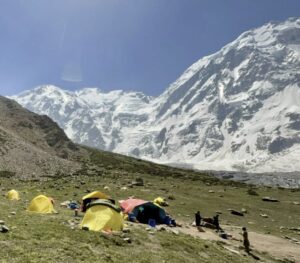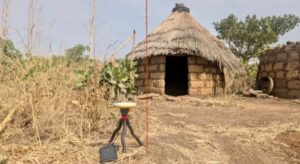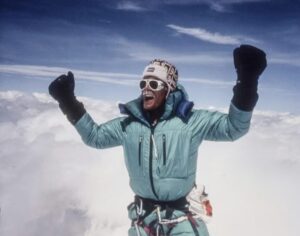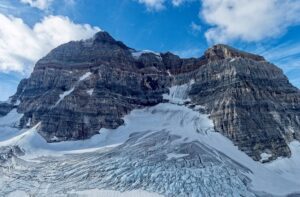Two weeks ago, Irina Galay was planning to climb Annapurna in the spring. Now she has swapped her outdoor clothing for the military fatigues. Today, she is coordinating a corps of volunteers who are taking up arms to defend their country against the Russian army.
“We are good and highly motivated,” her partner tells ExplorersWeb. He sounds as confident as when he announced Galay’s success on K2 last summer. It’s hard to notice that he is talking a war, not a summit push.
They appreciate the many messages of support they’ve received from mountain friends and colleagues around the world. But they are also disappointed about some influential climbers who speak neutrally about a “conflict” between two parties rather than an invasion.

Irina Galay, then and now.
Walking the line
The attack of Ukraine startled the world when it started on February 24. Five days later, Kyiv still resists the bombing. Almost the whole world has spoken against the conflict. It has been an awkward line to walk for some with ties to both Ukraine and Russia.
“I always spoke Russian, I had many acquaintances in Russia, clients, friends(!), relatives, but three days ago everything changed,” Valentyn Sypavin said this week. The Ukrainian guide climbed with Russian clients last summer. He was the first to provide a factual, balanced report about the finding of Ali Sadpara, JP Mohr, and John Snorri’s bodies on K2 last summer.
But Sypavin couldn’t keep his temper when he spoke of how on the morning of February 25, his mother and son joined a 10km-long queue to flee Kharkiv. Ukraine’s second-largest city suffered heavy bombardment against civilian targets yesterday, according to international agencies. Sypavin gave sleeping bags and rugs to a neighboring family whose home had been destroyed by a missile.
“Rockets fly to peaceful neighborhoods in Ukrainian cities. It’s not a fake, it’s fucking Russian rockets!” Sypavin vented. “This is insanity! Everyone knows me as very tolerant. But the Russians attacked Ukraine! This is WAR! And now I rejoice when I [hear about] a killed Russian soldier or a burned Russian tank or column.”
The life they knew is over
Many Ukrainian climbers have shared similar messages. Mainly, they remark how one day they are working, climbing, meeting friends, going about their lives. Suddenly, the life they knew is over. Everything else has faded to irrelevance in the face of this tragedy.
Oleg Ivanchenko, the owner of a company called Extreme Guide, has turned the basement of his alpine club in Odessa into a shelter for those fleeing the bombing. On his Facebook page, he links to fundraising organizations that outsiders can contribute to. And he tries to reason with his readers in Russia and Belarus: “This is not your war. Stopping mad Putin and his supporters is within your power.”
International climbers and Institutions
At first, some opted for the non-committal “I’m against war” message. But as the Russian attack continued, more and more showed sided with Ukraine. We have seen no accounts that openly support Putin’s invasion, although some have tried to pin the blame on NATO to some extent. They also cite previous problems in the Donbas region. And predictably, they say it’s hypocritical to criticize the attack on Ukraine while remaining silent about other armed conflicts around the world.

Danyil Boldyrev, Olympic speed climber. Photo: ISFC
Meanwhile, Russia is becoming increasingly isolated, even in mountaineering. The International Federation of Sport Climbing has suspended the Boulder and Speed World Cup scheduled for this April in Moscow. They will find another host country. Likewise, the UIAA Ice Climbing World Tour has canceled the remaining two events, both in Russia, “in the interest of the safety of all participants and to maintain the integrity of the UIAA Ice Climbing World Tour.”
Elsewhere, climbers have stopped promoting their projects on social media because it’s inappropriate to post happy shots of snowy summits at such a time. Antonios Sykaris of Greece is no longer in the mood to talk about the 14×8,000m project that would normally be consuming him. “Instead of war being a bad memory, we see people being displaced from their homes within Europe itself [and] a new Cold War rising,” he wrote yesterday.
How about the Russians?
“As I see it, the climbing community splits into two big camps: one supports Putin’s decision, others are against it,” journalist Elena Laletina of RussianClimb.com told ExplorersWeb. “Some climbers are against war but support Putin’s politics.”
Laletina estimates that the opposition to Putin may be greater among climbers. In Russia overall, she says, it’s about 50-50. Although Russians can usually access international sources of information, “state propaganda is highly efficient,” she points out.
Laletina has covered mountain news for over 20 years; recently, mainly via social media. But now that Russia has blocked Facebook and Twitter, she has lost her platforms.
Remarkably, many Russians are openly expressing on social media their opinions for or against Putin’s war. Bravely, when they speak up against.
“So far, it has been no problem, but of course, we don’t know what will happen in the future,” Laletina said.

Police arrest Russian demonstrators against the war on Ukraine. Photo: Pavel Karavashkin/Fontanka
“Honestly, I really hoped the war would open many eyes but I hoped in vain,” wrote Russian climber Vladimir Stetsenko. “‘War is peace, freedom is slavery, ignorance is strength,'” he adds, quoting George Orwell’s 1984.
“I support Russia’s defeat, as bloody as possible, because Russia is the aggressor,” posted Dmitry Pavlenko, another Russian mountaineer. “That’s it. You’re with me or against me. Everything else is bullshit.”
Open letter
Anna Piunova and her staff at Mountain.ru addressed fellow Russians and the international community via an open letter penned by Nobel Prize winner Dmitry Muratov. Nearly a hundred people signed the letter, including the entire Mountain.ru team.
“Compatriots! The outbreak of Russia’s war against Ukraine is a SHAME,” it reads. “This is OUR shame, but, unfortunately, our children, a generation of very young and unborn Russians, will also have to bear responsibility for it.”

Poster featuring Ukrainian climbers, compiled by Mountain.ru staff of Anna Piunova, Kirill Filchenkov, Dmitry Klenov, Sergey Tretyakov, Maxim and Olga Kostrov.
Mikhail Fomin, one of the three Ukrainian climbers to forge the new route on Annapurna III last year, applauds the letter from besieged Kyiv. He told ExplorersWeb that he and his family are safe, so far.
The three Annapurna III climbers, worthwhile contenders for the next Piolet d’Or, have moved many in the community. “Incredibly, three of the most badass alpinists currently on Earth run a very real risk of being killed in the near future by the Russian military,” American Colin Haley wrote on social media. “These aren’t guys who grew up dreaming of going to war. They are super friendly, normal people who love to climb mountains, love their families, and just want to live a peaceful life.”

Nikita Balavanov of Ukraine and Colin Haley of the U.S. Photo: Colin Haley
Open wounds
Mountaineering is supposed to be a place where people from all walks of life share a common goal, and often work together. The war has broken friendships and turned former Base Camp partners into irreconcilable enemies. It has also shown some brave souls and caring friends.
Two days ago, Irina Galay received a satellite phone call. It was her climbing partner on K2, Mingma Dorchi Sherpa, the CEO at Pioneer Adventure. He was at 7,000m on the South Face of Cho Oyu. “I want to reach the summit: I will do it for Nepal and for Ukraine,” he said.
Among the sirens and the blasts, it sort of made her day.






